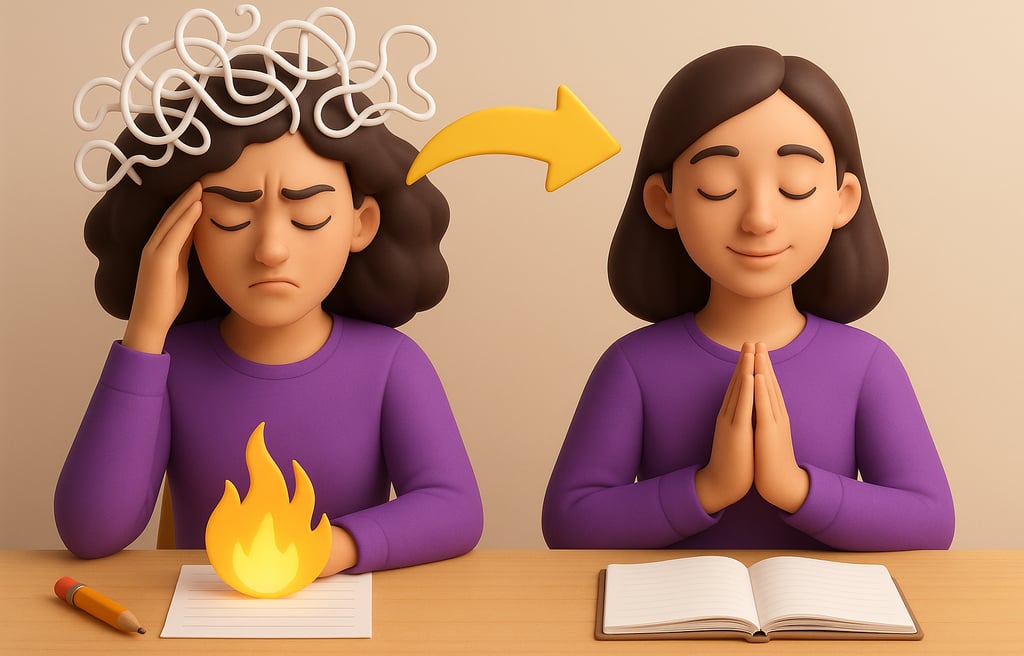I’m Still Learning Not to Overthink (And That’s Okay)
There are moments when I catch myself overthinking and I feel disappointed, especially when it leads me to react in ways I wish I hadn’t. When it involves others, I’ll always apologize. And when it’s just me, I’ve learned to apologize to myself too. Because nothing and no one is perfect, even when you try to stay positive, there will be days when you’re not your best self. What I keep learning is to know the difference between overthinking and observing. Not every voice in my head is anxiety, sometimes it’s my body or my mind trying to process something new. I’ve learned to listen, but only to thoughts that come from peace, not tension.
Island Mamaya
11/10/20253 min read


The Label That Follows Us: “Women Overthink Too Much”
It’s funny (and sometimes frustrating) how people love to label women as overthinkers. As if it’s written in our DNA. But overthinking isn’t a “woman thing.” It’s a human thing.
Still, let’s be real… our hormones, emotions, and intuition sometimes make the mind louder than we wish it to be. And when you care deeply or love genuinely, it’s hard not to think too much.
But that doesn’t mean we’re weak, it means we feel deeply, and sometimes our feelings are
Let’s be honest, overthinking is exhausting.
It’s like having a thousand tabs open in your mind, and no matter how many you try to close, a new one just pops up. You tell yourself to stop thinking too much, but your brain replies, “Okay, but what if…?”
And truthfully? I still struggle with it.
I still replay conversations, analyze every word, and wonder if I could’ve handled something better. Not because I’m dramatic or emotional, but because when you do everything on your own, your mind becomes your constant companion.
When you don’t have someone to share your thoughts with, it’s not about depending on anyone. It’s just that your brain has nowhere else to go but inward, so it starts talking, looping, and analyzing everything.
Overthinking vs. Observing — Know the Difference
Here’s something I’ve also learned recently: Not every voice in your head is overthinking.
Sometimes, your mind or body is just trying to process new information, emotions, or experiences. That voice that asks questions or points things out isn’t always your anxiety talking; it can also be your intuition observing and gathering facts.
The key is to recognize where that voice comes from, if it comes from peace and curiosity, it’s observation. If it comes from tension and fear, it’s overthinking. You still have to listen but listen with awareness.
Use those observations as gentle information to help you make decisions, not as fuel for endless mental debates.
When Overthinking Feels Like Failing
I’ll be honest, it disappoints me when I realize I’m overthinking again. Especially when I thought I had already outgrown it.
That moment when you go, “Damn it, Catharina , you did it again.” Sometimes, that self-awareness hurts more than the overthinking itself.
And when my overthinking affects someone else, I’m always the first to apologize not out of guilt, but out of responsibility. And when it only affects me?
I still apologize to myself. Because sometimes I forget that I also deserve forgiveness.
Healing Is a Lifelong Work-in-Progress
I’ve learned that healing isn’t about reaching a point where you never overthink again. It’s about knowing how to return to peace faster each time.
There’s no final version of yourself, only evolving versions, each a little more grounded, more patient, and more self-aware than before.
So, if you’re reading this while your mind is spinning with thoughts please remember this :
You’re not broken.
You’re just processing.
You’re learning to separate noise from truth.
You’re not supposed to be perfect, just aware enough to keep growing.
Because healing doesn’t mean never falling again, it means rising softer every time you do.
The Art of Not Being Too Hard on Yourself
One of the biggest lessons I’ve learned (and keep relearning) is this: don’t be too hard on yourself. Nothing in life is perfect, not your thoughts, not your emotions, not your healing.
No matter how positive or grounded you are, there will always be moments when you’re not your best self and that’s okay.
You’ll overthink.
You’ll misread situations.
You’ll say things you didn’t mean.
You’ll react instead of respond.
But what truly matters is what happens after.
Because every time you catch yourself, you gain new wisdom. You learn how to react differently next time, how to pause sooner, how to listen better.
Healing isn’t a straight line, it’s messy, imperfect, and constant, it’s a work-in-progress that never ends, because we never stop growing.
What Helps Me When I Start to Overthink
Over the years, I’ve collected a few practices that help me calm my thoughts and find my center again:
Write it down — and burn it : When my mind is racing, I write everything down on a piece of paper, every thought, every fear, every “what if.” Then I burn it. Watching it turn to ash feels like releasing emotional weight.
Breathe and move : Deep breathing, yoga, or even just cleaning my space helps me reset. Physical movement grounds the mind.
Ask: “Is this real or imagined?” : I check myself: Do I have proof for this thought, or is it just a story I’m creating? That alone saves me hours of unnecessary anxiety.
Set a mental time limit : I give myself five minutes to think about something, then stop. It’s like putting boundaries on your brain.
Talk to yourself kindly : When I make mistakes or overreact, I remind myself, “You did your best with what you knew. Next time, you’ll know better.” Self-compassion is the real key to healing.
Love,
CM
